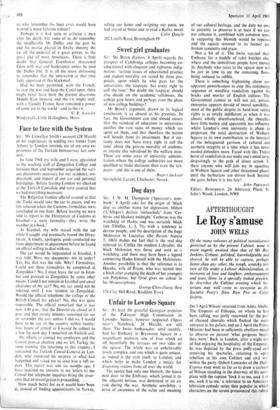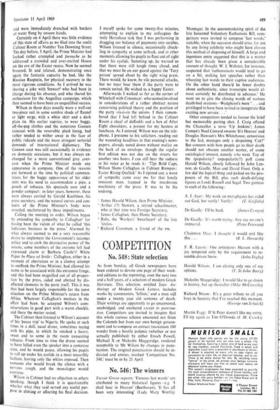Le Roy s'amuse
AFTERTHOUGHT JOHN WELLS
Of the many volumes of political "reminiscence promised us by the present Cabinet, none is more eagerly awaited than that of Mr- Roy Jenkins. Urbane, polished, knowledgeable and shrewd, he will be able to capture, perhaps better than any other, the rough, scratchy tex- ture of life under a Labour Administration, its moments of love and laughter, embarrassment and tears. Here, in a specially leaked preview, he describes the Cabinet meeting which his- torians may well come to recognise as the Socialist Party's Dien Bien Phu or Crêpe Suzette.
On 3 April Wilson' returned from Addis Ababa. The Emperor of Ethiopia, on whom he had been calling, was justly renowned for the pair of chained cheetahs which flanked the main entrance to his palace, and on 2 April the Prime d Minister had been in sufficiently ebullient mood to observe en passant 'what gorgeous beast, they were Back in London, after a night out of bed enjoying the hospitality of the Emperor, he was depicted by the press puffy-eyed and removing his spectacles, returning to open rebellion in his own Cabinet and civil war ' within the party. Osbert Lancaster of the Daily Express even went so far as to draw a cartoon of Wilson standing in the doorway of his aero- plane with the caption 'Sock it to me, sock it to me, sock it to me,' a reference to an American television comedy series then popular in which characters on the screen pronounced this rubric
and were immediately drenched with buckets of water flung by unseen hands.
Certainly on 4 April there was little evidence of this state of affairs as we filed into the sunlit
Cabinet Room at Number Ten Downing Street. The day before, 3 April, the Prime Minister had looked rather crumpled and farouche as he addressed a crowded and over-excited House on the eve of the Easter recess. Now he seemed bronzed, fit and relaxed, demonstrating once
again the fantastic capacity he had, like the Russian Rasputin, for physical recovery in the most rigorous conditions. As I arrived he was sharing a joke with Steware who had been in charge during his absence, and who shared his enthusiasm for the Anguillan campaign, which then seemed to have been an unqualified success. Wilson in those days usually wore a well-cut two-piece suit in some sombre shade of flannel or light serge, with a white shirt and a dark plain tie. His earlier caprice, to wear baggy, off-the-peg clothes and the notorious Gannex raincoat with the reversible plaid lining, had rather tended to wither away in the face of public ridicule and the more stringent sartorial demands of international diplomacy. The Gannex coat was still occasionally in evidence on domestic occasions, but it was always ex- changed for a more conventional grey over- coat when the Prime Minister made any appearance in company. One of the reasons put forward at the time by political commen- tators for the baggy appearance of his older suits was his need to accommodate a pipe, a pouch of tobacco, his spectacle case and a powder compact : in later years, however, these were always carried by Gerald Kaufman, his press secretary, and the natural curves and con- tours of the Prime Minister's body were revealed, uncluttered by these impedimenta.
Calling the meeting to order, Wilson began by extending his sympathy to Callaghan' for
having been the victim of what he called 'this
ludicrous business in the press.' Alarmed by what always seemed to me a very reasonable desire to implement the Government's incomes policy and to curb the destructive power of the unions, some members of the extreme left had expressed alarm at Barbara Castle's' White
Paper In Place of Strife: Callaghan, either in a moment of aberration or in a clumsy attempt
to outflank the Prime Minister, had allowed his name to be associated with this extremist fringe, and this had been magnified out of all propor- tion by the press, aided and abetted by dis- affected elements in the party itself. This it was that had been largely responsible for the tense situation on the Prime Minister's return from Africa. Whatever Callaghan's motives in the affair had been, he accepted Wilson's com- miserations in good part with a warm chuckle, and there the matter rested.
The Cabinet then listened to Wilson's account of his 'peace trip' to Nigeria. He spoke at such times in a dull, nasal drone, sometimes toying with his pipe, in which he smoked a heavy, sweet and to some in the room nauseating tobacco. From time to time the drone seemed to have lulled even the speaker into a comatose state, and he would pause, allowing his pupils to roll up under his eyelids in a most unearthly fashion, leaving only the whites exposed. Then someone else would break the silence with a nervous cough, and the monologue would continue.
Wilson in Cabinet had no objection to others speaking, though I think it is questionable whether what they said served any useful pur- Pose in altering or affecting his final decision. I myself spoke for some twenty-five minutes, attempting to explain to my colleagues the truly Herculean task that I was performing in dragging our balance of payments into surplus. Wilson listened in silence, occasionally chuck- ling in sympathy at some setback, and at other moments allowing his pupils to float out of sight under his eyelids. Summing up, he warned us that there were still tough times ahead, and that we must be on our guard against the 'Tory poison' spread about by the right wing press. There would, be knew, be vile personal attacks, but we must bear them if the party were to remain united. He wished us a happy Easter.
Afterwards I walked as far as the corner of Whitehall with Crossman5, who seemed involved in considerations of a rather abstract nature concerning political theory and the position of the party vis-a-vis the unions. I then remem- bered that I had left behind in the Cabinet Room a sheaf of daffodils and a box of After Eight chocolates, a present for my hostess at luncheon. As I entered. Wilson was on the tele- phone. I presume to his solicitors, reading out the wounding headlines in that evening's news- papers, already noted down without malice on the back of an envelope. though the regular first edition was not due on the streets for another two hours. I can still hear the sadness in his voice as he reads it : '72pt Bold Caps, Wilson Slams Callaghan in Cabinet Rumpus: Easter Rising Quelled.' As I tiptoed out, a wave of sympathy came over me for that lonely innocent man, trapped in the murderous machinery of the press. It was to be his undoing.
' James Harold Wilson, then Prime Minister.
= Arthur (?) Stewart, a retired schoolmaster, who at that time was Foreign Secretary.
James Callaghan, then Home Secretary.
' Babs, the 'Workers' Sweetheart' of the late 'sixties.
Richard Crossman, a friend of the PM.



































 Previous page
Previous page